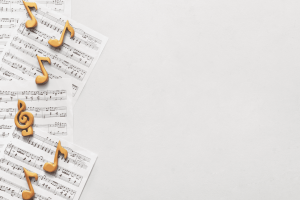Broadway Combos: Gamifying MT Rep

As a voice faculty member at Pace University, a BFA Musical Theater program in NYC, I’m asked to make repertoire suggestions A LOT. Our students are frequently submitting for gigs and shows holding auditions in the city, and the requested repertoire and stylistic combinations can be as wide-ranging, creative and quirky as the writers and casting directors desire:
“Please bring in 16 bars of a song with strong jazz sensibilities that show off your operatic/legit sound, and demonstrate your ability to sing bluegrass and folk music—and not from a musical.”
I’m being a little facetious, but only a little. As a voice teacher, I used to get frustrated by some of these esoteric requests, but have grown to really enjoy and embrace them. And why? Because they’re fabulous catalysts for assigning and expecting new repertoire in the studio setting.
I love having both short and long-ranging repertoire plans for my university students. The long-range repertoire goals ensure that we have 12-14 weeks to gather and record benchmarks and progress on a few pieces, including recorded video/audio data to experience and observe growth—in real time and IRL with my students (thank you Voice Memo and smart phones!).
College is expensive, and lesson time and tuition money is precious. It’s important to me that students understand that their vocal and artistic growth is quantifiable, and not reliant upon technique-mystique pedagogy—hoping that today at 2:30pmEST, the muse Calliope will visit us for 45 minutes. If she does, great. But let’s not rely exclusively on her. She’s busy.
Alongside the longer-term rep goals, our short-range planning is frequently comprised of repertoire that’s assigned as part of our terraced BFA MT curriculum, in courses like MT History and Rep; Acting the Song; and Audition Techniques and Senior Showcase. Instead of getting frustrated that some of these pieces will likely only have a voice lesson shelf-life of 2 weeks or so (until a new song is assigned in one of those classes), I recently opted to borrow an idea from a course that my friend and colleague William Waldrop and I came up with during the height of the pandemic lockdown, during the proliferation of online classes on artistry and technique. Our contribution was Broadway Combos.
Broadway Combos was a three-session vocal masterclass series that William, a Broadway Music Director and vocal coach and I devised addressing
- ‘what they’re listening for behind the table’ and then
- ‘making our voices do what we want them to do in auditions’
To focus on the course content, we structured the Broadway Combos intensive as a strategic book building course highlighting a combination of iconic composers with each successive iteration of the course.
Our first run of the course was Broadway Combos: Kander & Tesori Edition. And that’s what I adapted for a semester of short-term repertoire planning for a semester last year. For a portion of a semester, I worked with several of my students to select and tech a combination of John Kander and Jeanine Tesori songs from the MT canon which could also potentially ‘fill a hole’ in their book. At Pace, it was a blast to serve as rep guide to my voice students, some of whom associated this combo primarily with Thoroughly Modern Millie or Kimberly Akimbo (Jeanine Tesori) and Chicago or Cabaret (John Kander). Some had been less aware of the treasure troves of songs written by this particular Broadway combo.
A particular thrill was highlighting the connection that Barbara Howard, the beloved kindergarten teacher and school matriarch on the hit TV show Abbott Elementary is played by Sheryl Lee Ralph, the Dream Girls Broadway star heard on the Millie soundtrack singing Tesori’s ‘Long as I’m Here With You’ and ‘Only in New York.’
If you’d like to give this Broadway Combos assignment a try (for yourself or with your students), here are just a few examples of the Kander & Tesori combos from that semester, which several of my students performed on our end of semester studio class (all dates are Broadway production premiere years):
Phoenix selected and worked on ‘First You Dream’ (Steel Pier, Kander, 1997), and ‘Days and Days’ (Fun Home, Tesori, 2015).
Alexa chose ‘Kiss of the Spider Woman’ (Kiss of the Spider Woman, Kander, 1993), and ‘On my way’ (On My Way, Violet, Tesori, 2014).
Leroy’s combo was ‘Music, Money, Love’ (New York, NEW YORK, Kander, 2023), and ‘Who I’d be’ (Shrek the Musical, Tesori, 2008).
Assignment components and educational benefits included a brief repertoire survey of the composers’ literature, as well as some guided listening assignments in order to construct the combos, as well as a deeper understanding of the wide-ranging vocalism required for this particular combo. Specifically, much of Tesori’s music in Millie is pastiche music, and is wildly different from her more contemporary-sounding score of recent Broadway hit Kimberly Akimbo. The assignment also allowed for some conversation of crossover, noting that Jeanine Tesori’s new opera Grounded will open the Metropolitan Opera’s 2024-25 season later this year! I hope you’ll try your hand at Broadway Combos, and please reach out to let us know what and who you combine! IG: @peter.thoresen
